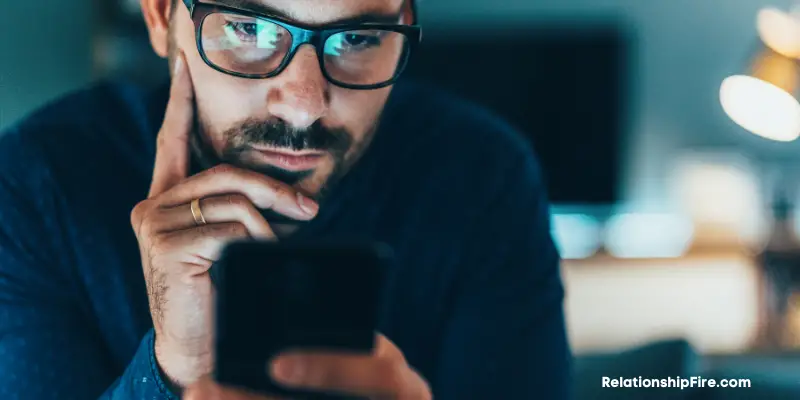Text messages can be confusing, as there are often several possible meanings.
For example, What does I- mean in a text message?
In texting, “I-” can have several different meanings. It can mean that the person is speechless or does not know how to explain what they want to say. “I-” can also mean that the person is reluctant to express their current thoughts or feelings. It might also mean that the person was interrupted.
In this blog post, we will explore the different meanings of “I-” in a text message and help you understand what it means in different situations.
What Does I- Mean in a Text Message? (7 Answers)

There are several potential interpretations of “I” in texting.
A few of the most common meanings of “I-” in texting include:
- Speechlessness (or a loss of words)
- Emotional Pause
- Interuption
- Reluctance
- Informality
- Typing mistake
- Ending the Conversation
Speechlessness
One of the most likely meanings of “I-” in texting is astonishment or speechlessness.
This may also come in the form of the letter “I” without the dash, meaning essentially the same thing. Shocked, astonished, lost for words, or surprised.
It implies that the individual was alarmed by what they just witnessed, heard, or received.
Example #1:
Mr. A: Omigosh, did u know Kylie likes Mike?
B: I-
Example #2:
A: Hey, so I thought u should know I like u…
B: I-
Example #3:
A: *Sends an inappropriate and unsolicited picture*
B: I-
As in almost every kind of communication, you might want to think about the context before figuring out for sure what it means.
Emotional Pause
When you receive “I-” in a text message, it can sometimes feel like a loaded pause.
The other person might be about to say something serious, or maybe their just unsure of how you will react to what they’re about to say.
Either way, that little “I-” can convey a lot of emotion.
In this case, the symbol can be used when someone is not quite sure how to express what they’re feeling, or when they need a moment to gather their thoughts before responding.
The “I-” gives them a chance to take a breath and collect themselves before hitting send.
Another way the “I-” can be used is to indicate that what you’re about to say is important. This might be something that you’ve been thinking about for a while, or something that you want the recipient to really take note of.
By starting with an “I-“, you’re letting the person know that what follows is worth their attention.
It’s like a different way of saying “uh-” That is to say, if someone informs you they robbed a bank, you’d say “I-” and then pause for a moment.
When you are guilty, people frequently say things like ” I- I’m sorry…” or something like that.
Almost like a stammering response.
Interuption
Have you ever been in the middle of typing out a text message when you suddenly get interrupted?
Maybe your boss calls you into a meeting, or your kid starts crying.
Whatever the case, it can be frustrating to try and resume your message after the interruption. A lot of people use the “I-” at the beginning of their messages to indicate that they were interrupted mid-thought.
For example:
Person A: What are you doing this weekend?
Person B: Not much, I-
This is similar to how authors use a dash to show when a character is being interrupted in dialogue.
Of course, you don’t have to use “I-” if you don’t want to.
But if you’ve ever found yourself struggling to pick up where you left off, it might be worth giving it a try.
Reluctance
You’ve probably seen it before: Someone sends you a text message that starts with “I-” and then trailed off into nothing. Maybe you’ve even sent a few yourself.
This could mean that the person is unsure of what they want to say and is thinking through their options.
Someone might send “I-” when they’re not sure if they should share something with you or whether it’s worth getting into a potentially difficult conversation.
They might be about to admit something or apologize.
Basically, they’re feeling reluctant or hesitant about what they’re about to say.
This might be because they’re worried about how you’ll react or because they’re not sure if they should bring something up at all.
Informality
I’ll confess that I frequently use emojis, abbreviations, symbols, lowercase, etc. because I want to appear laid-back and carefree.
I know it’s silly.
However, when it comes to texting or tweeting, there are no rules that you must be formal.
Text messages allow us to express ourselves in a more individualized manner. People do that with a variety of nonstandard written languages, such as symbols, lowercase letters, eliminating punctuation, slang usage, abbreviations, and emojis.
“I-” could simply be a way for someone to write in a very informal and unorthodox style.
Ending the Conversation
If you’ve ever found yourself in a text message conversation that suddenly ends with a curt “I-“, you may have been surprised or even offended.
But it’s important to understand that this doesn’t always mean that the other person is angry or upset.
In fact, “I-” can simply be a way of punctuating the end of the conversation.
Now, it could be a “text message” way of slamming down the phone receiver, but that’s not always the case.
Rather, it might be a way of saying, “I’m done talking now.”
Of course, this doesn’t mean that you should start ending all your text conversations with “I-“. There are better approaches.
But if someone else does it, don’t take it too personally. The might simply want to signal that the conversation is over.
Typing Mistake
If you’ve ever been in the middle of a texted conversation and seen an accidental “I-” show up in someone’s message, you might have wondered what it meant.
Was the person about to say something incriminating? Were they planning to confess their love for you?
More than likely, is is simply a typo.
Example:
Mr. A: so how was ur day?
Mr. B: oh not that great, I-
It’s easy to see how an “I-” could be misconstrued as having some sort of hidden meaning.
After all, when we see someone start to type out a word and then backspace over it, it can feel like they’re holding something back.
But in reality, an “I-” in a text message could just be a mistake.
People often type out words quickly without thinking too much about them. As a result, it’s not uncommon for fingers to slip and hit the wrong keys.
An “I-” can easily be generated by this kind of mistake.
And because we often don’t proofread our text messages as carefully as we do other forms of writing, the error can go unnoticed until it’s too late.
So if you see an “I-” in a text message, take it with a grain of salt.
How To Know What “I-” in Texting Really Means
As we’ve seen, “I-” can mean a lot of things in a text message.
It could be the person is about to admit something, make an apology, or say goodbye. The best way to figure out what “I-” means is to asses the context of the conversation and directly ask the other person.
If you’re not sure what “I-” means in a text, then it’s probably best to not assume anything and just ask.
That way, there won’t be any confusion or misunderstanding. And you probably don’t want either of those outcomes.
Asking will save you a lot of time and hassle in the long run.
Here is a good video that goes over the meaning of other common texting abbreviations:
What Does I Mean on TikTok?
On TikTok, “I” can have the same meaning as when it’s used in a text message.
However, “I” can also mean other things on TikTok.
It can mean a lower case “L” as in “loser.” It’s a way to troll or bully the video creator.
It can also mean “1st” as in the commetor is the first to watch the video. TikTok followers use “1st” as a sort of clout. When used in this way, it’s meant to be complimentary.
The creator of the video is often happy to have received a “1st.”
But, sometimes, the comment is more about the commenter than the creator. It’s a way for someone to boost their own ego by pointing out that they were the first to watch a particular video.
Final Thoughts: What Does I- Mean in a Text Message?
We have several other articles on this site about what different text messages and phrases mean.
Check a few of them out before you go. Thanks for reading!
Related posts:

